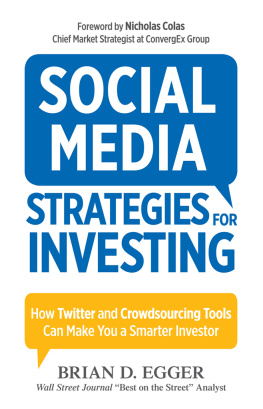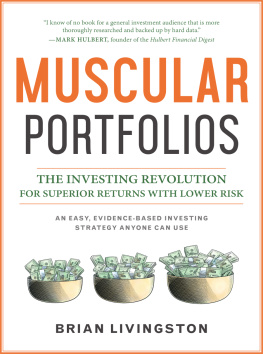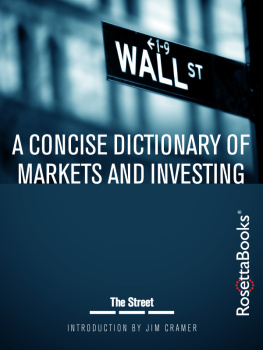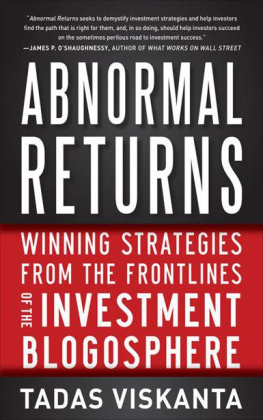Contents
Guide
SOCIAL MEDIA
STRATEGIES FOR INVESTING
How Twitter and Crowdsourcing Tools Can Make You a Smarter Investor
BRIAN D. EGGER
Wall Street Journal Best on the Street Analyst
Foreword by Nicholas Colas
Chief Market Strategist at ConvergEx Group

AVON, MASSACHUSETTS
Contents
Foreword
Imagine that a wealthy and elderly uncle invites you for a visit. Over lunch, he reveals that he plans to leave you a considerable sum of money in his will. There is a catch, however. He will either leave you $1 million, or you can flip a coin with him. If you win the toss, you get $3 million. If you lose, you get nothing. Your elderly relative has developed a playful streak in his old age!
If you are like most people, you would choose the $1 million sure thing. But consider the other option for a moment: It is actually worth much more than $1 million because a 50/50 shot at $3 million is worth $1.5 million. Still, that $1 million bird in the hand would set you up for life. Thanking your uncle for his generosity, you part ways, happy that your financial future is finally secure. His coin, meanwhile, stays safely in his pocket. Imagine the regret you would feel, if you were to lose the coin toss and walk away with nothing.
This story, anchored in the Nobel Prizewinning concept of prospect theory, reflects an important lesson about how humans make financial decisions: Its not just about the money. If it were, youd flip the coin and take your chances. Instead, we make constant tradeoffs that aim both to maximize our happiness and to minimize future handwringing over our decisions. Losseseven if merely imaginedweigh heavily on our psyches and profoundly inform our choices.
Happily, technology is a highly useful tool for managing this never-ending tightrope of difficult financial decisions, both big and small. If you are buying a house, you can check numerous real estate websites to evaluate your options. Considering the purchase of a new car or television? An Internet search will help you find the best price and let you read in-depth product reviews. Perhaps you are out on the town with friends. With your smartphone, you can check into every eatery nearby, find a highly rated one, and even book a table. In each case, technology allows you to maximize your choices andjust as importantlyminimize potential regret.
For all the clear benefits of technology in your daily life, chances are very good that you dont leverage it effectively, when it comes to investing. But why not? Part of the answer is obviously that nagging fear of regret. We worry that well make the wrong decision and lose part of our hard-earned capital with an ill-considered investment from a dubious source. A larger issue, however, is that the Internet is a firehose of information, and it is hard to know where to begin, and whom to trust.
When faced with an overwhelming array of choices, we tend to revert to the familiar ones even if they arent the best options out there. In other words, despite a dizzying array of twenty-first century tech-enabled information resources, we tend to act on a limited menu of choices. To effectively balance the wealth of information available to us with our natural avoidance of regret, we need a clear and consistent strategy. Without such a playbook, our psychological tendency toward regret would be a permanent and unwelcomed third wheel.
Consider the topic of this book: social media and the investment process. Chances are that you know something about both, but they are difficult and complex topics. Keeping up with all the latest Internet outlets for individual social expression is a full-time job, and there seem to be new offerings every week. And investing is never easy, with the last decades volatility only adding to the confusion.
A marriage of these two subjects of social media and investing might seem like an unholy alliance. But technology marches forward, and we must follow in its path. The good news is that you already have the skills and, if youve read this far, you clearly have the interest to succeed in this new challenge. Theres even better news: You have an excellent guide on your journey with the author of this book, Brian Egger. I have known Brian for twenty years as a colleague and friend, and his ability to think clearly about the complex world of investing is first-rate. You are in good hands here.
The investment process in light of social media is an important topic for individual investors to understand. Even if you only choose to use a fraction of the contents of this book for your investment decisions, you will be better off for it. Institutional investorsbig money hedge funds, mutual fund managers, pension funds, and very wealthy individualsconstantly scramble to leverage every possible advantage and reach their goals. Using social media is the single hottest topic for many of them at the moment. Hownot ifthey choose to incorporate this technology into their investment processes will play an increasingly important role in how they value securities in coming years. As an investor you need to understand these changes too, and that is the purpose of this book.
In the end, investing is simply a microcosm of our lifes journey. We constantly make choices between two scarce resources: time and money. We proactively seek happiness while seeking to minimize regret. At the same time, the rules are always changing, and we have to change with them. Using every resource at our disposal, guided by those whom we trust, is the best way to navigate the investment landscape. The use of social media in investing is now part of the capital markets, so it must be on your roadmap.
After all, wouldnt you like to be that capricious rich uncle one day?
Nicholas Colas
Chief Market Strategist
ConvergEx Group
Introduction
Social Media: A Key to Stock Market Survival
In recent years, social media has become a linchpin for investment success. Mounting evidence suggests that the messages on Twitter and investing websites, such as StockTwits, can predict future stock market behavior. However, the importance of social media as an investing tool extends well beyond its predictive capacity. Twitter and other online communities are often the best source of insight into the causes of breakout moves in stocks. For a growing number of companies and research organizations, social media websites have become the venues of choice for communicating with investors about business trends. These websites are often the first and best sources for learning about the outcome of policy decisions that determine the fate of corporations. By using social media, investors may be able to learn about breaking news before it hits the mainstream media.
For those who might question whether or not social media can make them smarter investors, consider the alternative proposition that media can make them smarter investors. Very few investors I know would question the validity of that assertion. The problem seems to be with the social aspects of social media. As an investor, you must get past the perception that Twitter, Facebook, and YouTube are little more than virtual sandboxes for overgrown adolescents who are prone to idle gossip.
If you think social media has some growing up to do, and isnt quite ready for Wall Street, think again. An expanding segment of the investing population is embracing the value of the social web as a vehicle for learning more about investments and the stock market. Instances of corporate tweeting are becoming the rule rather than the exception. On January 16, 2014, retailer J.C. Penney rankled industry analysts when it announced that it would begin breaking information such as marketing campaigns or low-level employee hires exclusively through its Twitter account. J.C. Penney wants to have the flexibility to use Twitter to communicate with the Street without the formality and time-consuming requirements of a press release.








